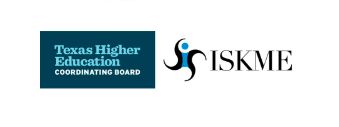
2025 Open Educational Resources (OER) in Texas Higher Education Landscape Survey |
Introduction
We invite you to participate in the 2025 OER Landscape Survey as part of our ongoing efforts to assess and enhance the use of Open Educational Resources (OER) in Texas. This survey, developed in partnership with the Texas Higher Education Coordinating Board (THECB) and the Institute for the Study of Knowledge Management (ISKME), builds on data collected in the 2019, 2021, and 2023 surveys. Your institution’s contribution will add to the body of knowledge about OER use in Texas and help to inform future program, service, and resource development at the state level.
The Texas Higher Education Coordinating Board will use survey data, including institutional identifiers, to develop a comprehensive regional analysis supporting OER initiatives statewide. Your institution will have opportunities to participate in future focused discussions on these topics and receive notifications about services and resources developed from the survey findings.
How to Participate:
-We recommend reviewing the survey in PDF form, provided in the email invitation.
-If you have any questions or need clarification while completing the survey, please feel free to consult with colleagues, such as those in the Institutional Research Office, library staff, or faculty members involved in OER.
-If you wish to review your institution's previous survey responses (from 2023 or earlier), feel free to contact Anastasia Karaglani, Senior Research Associate at ISKME, at anastasia@iskme.org.
Please submit your completed survey by May 30, 2025.
Please direct any questions about the survey to Carrie Gits, Director of Digital Learning, at digitallearning@highered.texas.gov.
Defining Open Educational Resources (OER)
The Texas Higher Education Coordinating Board will use survey data, including institutional identifiers, to develop a comprehensive regional analysis supporting OER initiatives statewide. Your institution will have opportunities to participate in future focused discussions on these topics and receive notifications about services and resources developed from the survey findings.
How to Participate:
-We recommend reviewing the survey in PDF form, provided in the email invitation.
-If you have any questions or need clarification while completing the survey, please feel free to consult with colleagues, such as those in the Institutional Research Office, library staff, or faculty members involved in OER.
-If you wish to review your institution's previous survey responses (from 2023 or earlier), feel free to contact Anastasia Karaglani, Senior Research Associate at ISKME, at anastasia@iskme.org.
Please submit your completed survey by May 30, 2025.
Please direct any questions about the survey to Carrie Gits, Director of Digital Learning, at digitallearning@highered.texas.gov.
Defining Open Educational Resources (OER)
Texas Education Code, Section 51.451, defines OER as “teaching, learning, or research resource that is in the public domain or has been released under an intellectual property license that permits the free use, adaptation, and redistribution of the resource by any person.” The term may include full course curricula, course materials, modules, textbooks, media, assessments, software, and any other tools, materials, or techniques, whether digital or otherwise, used to support access to knowledge.
Please note the distinction between OER and free instructional materials. OER are free, but not all free materials are OER. OER are perpetually and irrevocably free. Even when they are taken off the web, OER that have been circulated can be used in accordance with their license forever. In contrast, non-OER free materials may only be free temporarily, and/or they may not allow modifications, adaptations and redistribution.
Please note the distinction between OER and free instructional materials. OER are free, but not all free materials are OER. OER are perpetually and irrevocably free. Even when they are taken off the web, OER that have been circulated can be used in accordance with their license forever. In contrast, non-OER free materials may only be free temporarily, and/or they may not allow modifications, adaptations and redistribution.